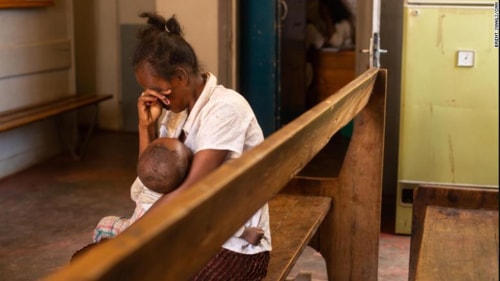Measles takes away 3 children from a family
Unable to vaccinate her children, Hasina Raharimandimby in Madagascar painfully witnessed three children die one after another from measles.
Measles came to Hasina Raharimandimby's family and took away the mother's three children, in just three days at the end of January.
"I remember giving them candy and snacks every time I came home from work. We used to play and feed the birds," Hasina recalled with a tearful voice. In this photo taken by a reporterCNNShe took a picture, holding her youngest child, her hands covering her eyes.
|
Hasina with her youngest child. Photo:CNN. |
Madagascar, an island nation in East Africa, is being hit by its worst measles outbreak in decades. According to the country’s Ministry of Health, since October 2018, more than 50,000 people have contracted measles, including 300 deaths, mostly children.
Measles is sometimes mistaken for a mild virus that poses little threat to human health. In fact, measles progresses rapidly and can lead to serious complications such as encephalitis, deafness, or death, especially in patients with malnutrition or a weakened immune system.
Hasina’s children died just days after contracting measles. Looking back, she blames herself for not getting them vaccinated in time.
"It's bitter," Hasina said. "You can't avoid death but any mother has to do everything she can to protect her child."
Lon Kightlinger is an epidemiologist in South Dakota, USA, serving in the field of public health. In his 60s, he traveled to Madagascar as a volunteer.
Thanks to his experience, Kightlinger knows how serious the measles outbreak in the East African island nation is.
"There was a doctor with 12 years of experience who had never seen a measles patient until a month ago. Since then, the patients have been pouring into the clinic and it hasn't stopped," said Kightlinger, in a small clinic outside the capital.Antananarivothree hour drive
In South Dakota, Kightlinger fought a measles epidemic that health workers quickly brought under control. In Madagascar, the epidemic swept through entire regions, including the largest towns and cities.
The measles virus is highly contagious, spread through coughs and sneezes, and can live in the air for up to two hours. If someone who is not vaccinated breathes the virus in or touches a surface contaminated with the virus, they can become infected immediately. Symptoms of measles include high fever, cough, runny nose, red eyes, and a rash all over the body.
Nowadays, not only poor countries but also developed countries are witnessing the return of measles. The main reason is due to lack of knowledge and false belief in erroneous scientific works, inaccurate information on social networks leading to non-vaccination.
In the US, experts believe vaccination rates have dropped below 50%. To achieve herd immunity, vaccination rates need to reach about 95% of the population.
Meanwhile, Madagascar residents who want to get vaccinated may not have the chance.
"Americans use all sorts of excuses to allow themselves to be complacent about measles," said Mr. Kightlinger. "As for the people of Madagascar, when they hear that there is a vaccine, most of them will immediately set off, ready to travel long distances and wait hours in the hot sun for their turn to get vaccinated."
Mr. Kightlinger now cycles miles every week to vaccinate villagers.
Vaccination remains the most effective way to prevent measles. Thanks to vaccination, measles deaths fell from 2.6 million in the 1960s to 110,000 in 2017.
Thanks to the vaccination program organized by the government, UNICEF and the World Health Organization (WHO), Dr. Andosoa Rakotoarimanana, Director of the Ambohimiandra Children's Hospital, hopes that vaccination rates in Madagascar will increase. However, the fight against measles still has many challenges.
On a minibus, Jean Claude Nambinintsoa and his 15-month-old son, Pierrot, traveled 24 hours to the hospital. “I was hoping to get him vaccinated,” Jean said. “But when we got there, they told me he had measles.”
In the village of the father and son, many other children also suffered from measles. Pierrot was also severely malnourished. Measles, a disease thought to have been defeated by humanity, was still out of control.
"This is a wake-up call for all people and health centers, not only in Madagascar but all over the world," Mr. Kightlinger emphasized. "Diseases like this will continue to come back and destroy humanity if we do not protect ourselves. These are extremely intelligent living viruses. They will find humans."
As for Hasina, she took her youngest child to the health center after noticing he was coughing. Fortunately, the doctor said he only had a cold and the cough was nothing to worry about. He has been vaccinated and hopes to have a better life than his older siblings.

